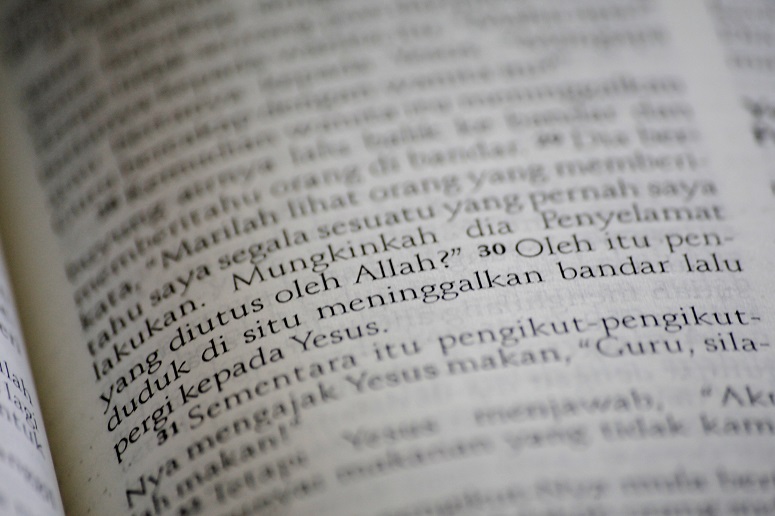Source: www.worldwatchmonitor.org
Date: March 17, 2021

A Malaysian woman’s campaign for Christians’ right to use the word “Allah” for “God” has succeeded after almost 13 years of court hearings and delays.
Jill Ireland Lawrence Bill has been campaigning for the right to use the word ever since immigration officials at a Kuala Lumpur airport seized eight Christian CDs from her in May 2008 because the CDs used the word “Allah” in a Christian context.
After a seven-year legal battle, Ireland was given back the CDs in 2015, but she maintained that the court had failed to address her constitutional right as a Christian to use the word.
In October 2017, her lawyer, Lim Heng Seng, noted that 60% of Malaysia’s Christians speak the Bahasa Malaysia (‘language of Malaysia‘), which uses “Allah” for “God”. The word (which predates Islam) has been used by local Christians for hundreds of years, since Europeans first spread the religion, long before Malaysia even came into existence.
He said Christians were never consulted when in 1986 the country banned Christians from using the word, and that the government’s blanket ban was unconstitutional and discriminatory.
After years of delays, including several this year due to COVID-19 lockdown, the Court of Appeals judge Nor Bee ruled in Ireland’s favour that the 1986 directive by the Home Ministry to prohibit Christians from using four ‘prohibited’ words, including ‘Allah’, was not a blanket ban.
She found the directive, signed by a Home Ministry officer and not a minister, did NOT intend to provide a blanket ban over the use of the four words, banned by the Cabinet in 1986. The other three are ‘Baitullah’ (House of God), ‘Kaabah’ (Islam’s holiest place in Mecca), and ‘solat’ (prayer).
The judge also ruled that the use of the words by Christians would not disrupt public order and so can be used by the community for teaching purposes – as they have been in East Malaysia (Sabah and Sarawak) and some parts of Peninsular (West) Malaysia for more than 400 years, saying “The directive on the prohibition that it would result in a threat in public order is not supported. In fact, the directive is deemed irrational and perverse”.
She said the Publication and Printing Presses Act 1987 (PPPA) is there to check on undesirable publications and not for the purpose of maintaining public order, morality or health.
“If the minister (then Datuk Seri Syed Hamid Albar) does not follow the law regulating the exercise of his power, then he has acted illegally, as he has gone beyond the limit of his power. The minister must understand the law. If the minister does not follow the law, he has acted illegally. In the present case, the minister has not acted according to the act (Printing Presses and Publications Act 1984, PPPA)”.
And Nor Bee ruled “The impugned directive (blanket ban circular) cannot be considered to be a subsidiary legislation.”
Lawyer Lim had said in 2017: “We say [this case was] neither reasonable nor proportionate…Here the use of the word ‘Allah’ for generations is just taken away without giving [Christians] the right to be heard.
“With all respect, nothing in the Federal Constitution says ‘Allah’ is exclusive to Islam; neither is there [anything about this] in the Quran,” he told the Malaysia High Court, as then reported by Malay Mail Online. “There is no copyright to the word ‘Allah’”, he added, so no-one should be able to claim “exclusive rights”, nor should Muslims claim an infringement of their rights if Christians use the word.
Judge Bee declared that Ireland has
- a right based on Articles 3, 8, 11, and 12 of the Federal Constitution to import publications in exercising her rights to practise her religion and education;
• a right to equality of all persons before the law that prohibits discrimination against her.
“The minister has no right to limit anyone’s right to profess and practise their religion,” Judge Bee said, adding this right to freedom of religion is stipulated under Art. 11, even though Islam is recognised as the religion of the federation under Article 3(1).
The argument that ‘use of the word Allah by non-Muslims would confuse Muslims’ had been used in the past.
But now three lawyers – Syahredzan Johan, Dr Azmi Shahrom and former law professor (now Tebing Tinggi assemblyman Dr Abdul Aziz Bari) – argued it would not.
Andrew Khoo appeared for the Christian Federation of Malaysia.

Background
It’s been well over five years since the Malaysian government gave back Jill Ireland’s CDs.
Muslim leaders across the world, and UN human rights bodies, decried Malaysia’s decision to ‘copyright’ the word ‘Allah’ for the exclusive use of Malay Muslims.
The Malaysian Catholic Herald newspaper had spearheaded the fight to overthrow the ban back in 2007, but its final appeal – to challenge the decision that it could not use the word in its Malay edition – was rejected in January 2015 by the Federal Court, the country’s highest legal authority.
In 2009, the High Court had ruled in favor of the Church, but that judgement was later overturned by the Court of Appeals; this latter decision was later affirmed by the Federal Court of Appeals decision. Since 2015, that judgement became binding on all cases of similar nature.
However, the Jill Ireland case was not bound by that decision, as her submission (and the court’s decision) was over a different line of argument, which the Federal Court did not consider in the Herald case; hence the Herald decision did not apply.
Even so, the Ireland case will now follow the same route. The government has already decided to appeal, so the case will go to the Court of Appeal and finally the Federal Court.
In March 2015, the Islamic Religious Council of the Malaysian capital applied to have its say in Ireland’s case, but this was dismissed.(It argued that it had the right to regulate non-Muslims on how to pray, and the materials they use – including audio and texts).
Jill Ireland continued to argue that she has the constitutional right to import and possess material that contains the word ‘Allah’ for God.
Ireland is Melanau, a group who mainly live in the Borneo states of Sabah and Sarawak, far from Kuala Lumpur, the capital in Peninsular Malaysia. Malay is the ‘lingua franca’ of Melanau Christians, so she argued they have a constitutional right to use the Malay term for God.
Sarawak is the only state in Malaysia with a Christian majority.
Ireland’s case was first heard in May 2009 and the High Court granted her leave for a judicial review.
In July 2014 the High Court ordered the government to return her CDs to her and pay $5,000 ringgit (US$1,335) towards her legal costs. But the government initially refused to return them and appealed against the ruling.
Both decisions now in Ireland’s favour have provided a measure of comfort to Malaysian Christians, whose faith and places of worship has in the past suffered a wave of attacks from Islamic extremists. Churches have been firebombed; copies of Malay language Bibles (also named from the Arabic root word for ‘The Book’ – Al-kitab) seized; effigies of the Editor of the Herald, Catholic priest Lawrence Andrew, set ablaze; and threats made to burn Christian Scriptures.
A local lawyer Stephen* said that, although this is a big step forward, there is still more work to do. “If you think about Rooney Rebit’s case (the Muslim-born Sarawakian who was able to change his religion to ‘Christian’ on his identity card in 2016), it’s true that he did win the case. However, it was a decision of the High Court, a lower court, and therefore doesn’t hold as much weight as the Federal Court, the highest court.”
This week a MalaysiaKini article quoted a Deputy Minister in the Prime Minister’s Department, Ahmad Marzuk Shaary, as saying “To empower sharia, especially in the Federal Territories, the government has drafted a Five-year Sharia Law Empowerment Plan 2020 to 2025….the government intends to enact 11 major sharia laws, including new legislation and existing laws and eight subsidy laws.”
(*not his real name, for his security)
